Have you ever driven a taxi in Cairo? Also in Cape Town and Rio? All cold coffee, you can forget it. The real adventure lurks in Tajikistan.

Strangely enough, our plane is being manoeuvred into the farthest corner of the huge airfield, although there are hardly any other planes. Perhaps this is Dushanbe's welcome to the Turkish competition. Tajikistan's welcome is rainy and cold. The only shuttle bus shows up after ten minutes and all passengers are allowed to board. Everyone, even if no one else goes in. The doors try to close with a rattling sound, but jump open again because some travellers get stuck in between. Friendly policemen push from the outside. It works!

Why on earth does the plane have to arrive at four in the morning? The customs officers are still asleep. Only two counters are manned. One for Tajik travellers, the other for everyone else. Strangely enough, almost all the passengers at the counter are for everybody else. Casually, with a cigarette in the corner of his mouth, the officer studies the passports, flicks back and forth until he puts his stamp in it with verve. The other unemployed officer climbs out of his cubbyhole and asks a few arrivals if they want to have the express check-in. He grins and rubs his thumb and index finger together. Anyone who has made it through the checkpoint, with or without express treatment, finds that even the men at the baggage claim area are still in the realm of dreams. After an hour, the baggage carousel finally starts moving. Sure thing: the baggage handlers have slept in. It's a good thing that my suitcase is one of the last, because this way I can bridge the time until dawn.

In contrast to the customs officers, the taxi drivers in front of the airport are remarkably busy and numerous and make an effort to catch a guest. My destination is the Afghan border, about 220 kilometres from Dushanbe. 200 dollars is the first driver's offer. I counter with 50 dollars. But this is probably an insult, because the man mumbles something in Russian, turns around on the spot and disappears. The next attempt also fails miserably. So we have to come up with a new plan. After talking to an employee of the airport I learn that I have to go to the outskirts of the city. For five dollars the airport man takes pity on me and takes me there. Before that we stop at a socialist hotel, where I have a cup of tea.

Babagul is the driver of my choice. Not because he claims to own the safest and most modern taxi in Tajikistan, but because no one else is there. The 220-kilometre journey to the Afghan border would easily be done in two and a half hours, he says and demands 40 dollars. Great, I think. Then I can still catch the 10 o'clock ferry. But already the first police check extends the driving time. Our taxi is waved out, and Babagul has to flip 20 Simoni into the open policeman's hand. There's no use arguing and complaining. We simply have too many policemen here, complains my golden-toothed driver. Meanwhile the rain has increased and the Tajik road shows its unsolid construction.

Small seascapes have formed everywhere on the cracked asphalt. While Babagul demands everything from his car and races through the masses of water without braking, the tyres say "Swim here now". Wild counter-steering helps, and the car spurts again to the next lake area.
Hopefully it will stop raining soon. I beg in spirit as I cling to the glove compartment. I ask Babagul to slow down a little. He nods and laughs. "You can still make the ferry," he calls and races on.
Shortly after leaving the city, Babagul slows down abruptly. An old woman stands at the roadside and asks something in Russian. Babagul jumps out of the car, puts her and her bundle in the back seat and races off again. All right, the lady lives somewhere along the way, I think. When the car suddenly leaves the main road and turns right into a muddy path. "We'll bring Mamushka home quickly," Babagul announces, "is the next village soon." The next village appears after 20 minutes of agonizingly slippery and potholes strewn road. Mamuschka wants to invite us for a cup of tea, but I suggest that we do it another time. Afterwards the same route back. Same misery.

Somehow we made it through an hour's drive without any major incidents. Then again a particularly strong specimen of the Tajik police with his whistle becomes noticeable. The officer wants money, but he also has another request. At the roadside there is a taxi with an open bonnet. Obviously broken. We should help. So we all try to push the collapsed car together. While the policeman stands beside it and gives us a push. 200 meters further on, we are all out of breath, and completely soaked is the vehicle in the same pitiful condition. Nothing moves. So my taxi ride from here on, by government order, will now be a cozy ride together.

Two women and two men climb into the back seat. The luggage trunk overflows, scantily secured with a tape. Every bump in the road is a direct hit. The shock absorbers refuse to work now of all times. But that doesn't stop Babagul from hitting the speed limit. My four new companions are Afghans who, like me, are on their way to Afghanistan..

Somehow they manage to empty some of their many bags and to hand out small, tasty pastries with folded arms. A thermos of tea is conjured out of the depths of chaos, and so everyone in turn can sip the wavering hot tea. This goes well until a bump in the road in combination with one of the infamous giant puddles makes the cup disappear into the abyss of the footwell, along with the tea. Since the gentlemen in the back seat are more or less condemned to immobility, the cup is not even looked for long.

Babagul has been doing his taxi driver job since the end of the civil war in 1997 and has been living quite well for Tajik standards since then. The income of my ride alone is equivalent to the monthly income of a university professor. Babagul is enterprising. With one hand he scribbles his mobile phone number on a piece of paper while juggling the car with one knee and the other hand through the landscape. "If you come back, call me," he says. "I'll get you a clean apartment. You can't go to the hotels here, much too expensive. And you can't take women there either." Oh, really, and the women? Of course, he could get them for a very reasonable price.

A little later a vehicle appears beside us. The driver honks and gestures wildly. Seems to be a friend of Babagul.
In order not to lose any time, Babgul grabs his mobile phone and calls our parallel travelling companion. Both cars come dangerously close to each other, in Russian and above all loudly, because our car rushes along under full load and full throttle, the two discuss something I don't understand. Then the parallel driver holds something against his side window, and through the wet windows I recognize a spare part. Only now Babagul pulls over, and after some haggling he buys the part.
Soaking wet, he gets back into the car and shows us the treasure he has acquired with great excitement. "Is a new accelerator cable," he rejoices. Because the current one is only patched up poorly. Well, I'm glad we have a replacement. "An accelerator cable is hard to get here, like so many things", says Babagul. "Or you have to pay big, big money."
"But where did the parallel driver get the accelerator cable then?" I ask. "Well, it must have fallen off a truck," Babagul grins over both ears.

In the meantime we have been on the road for a good five hours.
The car is still running. In between we made a few short stops to quickly take care of a few small things. Collect a hubcap, let a flock of sheep pass by, stretch your legs. Looking for a teacup, filling another policeman's purse. Oh yes, and of course the obligatory puncture. At 11am we reach the border river Amu Darya, which separates Tajikistan from Afghanistan in a natural way. We all pay for our nerve-racking trip. I my agreed 40 dollars, and the Afghan travellers are also in for 40 dollars. I think Babagul knows a lot about business. Included in the price is that Babagul will carry our luggage to the customs barracks. "When you come back, remember, call me," he blinks at me and shakes my hand in farewell.
The customs clearance turns out to be a tragedy. Customs officials are scurrying around everywhere, but nobody seems to be really interested in us. Carefully I ask in Persian where we have to register. The answer comes quickly and in Russian. From the gestures I gather: Wait. After an hour there is something like movement in the booth. The first Afghan traveller is called into an office. Half an hour later I am allowed to go into the office. A tightly dressed uniformed and mustachioed official greets me in Russian. Then the usual ceremonial follows. I flip the passport back and forth several times and then hammer the exit stamp on the visa. Finally I have to open my suitcase and the official examines my photo equipment. He holds up the camera and says something. I understand nothing and shrug my shoulders. The customs officer goes out and gets another uniformed man to help. He tells me in Persian that I have to pay customs for the camera. But from now on I can't speak Persian anymore and block any further attempts to take money from me. When the two officers realize that their game with me doesn't work, I am allowed to pack up everything again and finally go to the Afghan border. With an old, rickety bus we are all transported down to the river. And then we have to wait again.

The ferry is a junk tugboat, flapping and rattling. We all have to move on a kind of pontoon, on which several trucks and other vehicles also roll. So the ten o'clock ferry is now the three o'clock ferry. The weak old barge pulls the pontoon into the middle of the river with difficulty. And now the flow comes into play. It grabs our watercraft and drives it slowly downstream, while the tug keeps correcting the direction, thus slowly manoeuvring our island towards Afghanistan. Half an hour later, the pontoon actually bumps into the intended place on the Afghan shore. Hats off! I had already seen us disappear somewhere between Uzbekistan and the Aral Sea. The people put some bent iron beams between pontoon and shore. And then?

Then finally I enter Afghanistan. Now I only have to go to the Afghan customs and find a taxi for the onward journey. But that is really another story.
The route Dushanbe to Shir Khan Banda
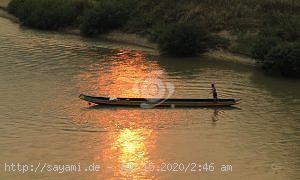
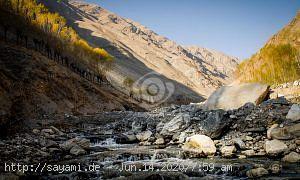
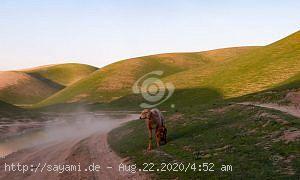
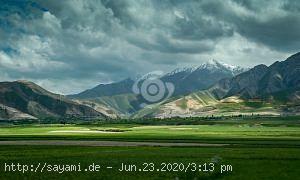
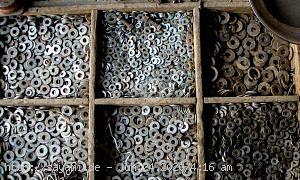
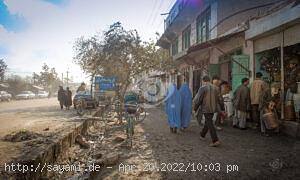

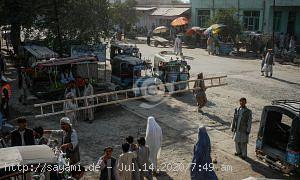
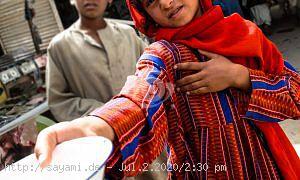
T O L L !
Angefangen und kurz reingesehen/-gehört.
Komme morgen wieder.
Heute nur kurze Begeisterungsbekundung ;-))
Haben Sie den Beitrag selbst gesprochen?
Merci. Ja ist selbst gesprochen!
This story would make a movie.
:-)
I loved reading your story. Your life is full of adventures.